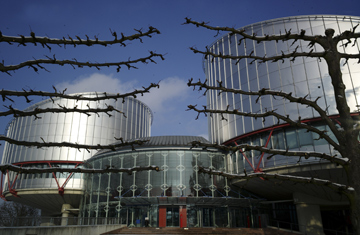
Outside view of the European Court of Human Rights, Thursday Dec. 16, 2010 in Strasbourg, France. Ireland's constitutional ban on abortion violates the rights of pregnant women to receive proper medical care in life-threatening cases, the European Court of Human Rights ruled
A ruling on the case of a woman known only as C has reignited the long-running and divisive abortion debate in Ireland. On Dec. 16, the European Court of Human Rights found that C, a cancer survivor, had her human rights violated when she was forced to travel to England to get an abortion. Now, overwhelmingly Catholic Ireland finds itself having to clarify a law that is sure to become a contentious issue in the looming election.
In cases that date back to 2005, three women — known as A, B, and C — went to the European court with the allegation that a lack of abortion services in Ireland was a breach of their human rights. On Thursday, the court rejected the cases of two of the women, but ruled in favor of C, who was living in Ireland and recovering from a rare form of cancer when she became pregnant. She feared that her cancer would return if she continued with her pregnancy, but no doctor was willing to tell her that her life was at risk if she carried the baby to term — and a threat to the mother's life is the only situation in which abortion is legal in Ireland.
This exception to Ireland's blanket ban on abortion is based on a 1992 ruling, called the X Case, by the Irish Supreme Court in which the court said that a suicidal teenager could not be prevented from traveling outside the state for an abortion. But successive Irish governments have failed to put the ruling into legislation, leaving women and health-care professionals in legal limbo, with doctors facing criminal sanctions if they perform an abortion (except in cases of cervical cancer, pre-eclampsia and ectopic pregnancy). So, like some 5,000 Irish women every year, C felt she had no choice but to go to England for her termination.
On Thursday, the European Court of Human Rights ruled that Ireland's abortion ban violates the rights of pregnant women to receive a lawful abortion in the event that a pregnancy could threaten their lives. The court condemned the failure of Irish leaders to legislate, which, it said, has resulted in a "striking discordance between the theoretical right to a lawful abortion in Ireland on grounds of a relevant risk to a woman's life and the reality of its practical implementation." The ruling doesn't change Irish law, but it does mean that the government has to officially clarify the situation.
Following the ruling, C's lawyer, Julia Kay, told national television station RTE the state had "turned a blind eye to protecting the life and health of women in such dire circumstances." It is time to make the abortion exception "not a hollow right," she added, but to "really allow women to access services when their life is in danger."
Pro-choice activists in Ireland applauded the ruling, with the Irish Family Planning Association describing it as a "landmark day" for women in Ireland. "The judgment leaves the state no option but to legislate for abortion where a woman's life is at risk," says chief executive Niall Behan. "This will offer clarity and offer protection to both women and their doctors."
Some in the pro-life movement also welcome the ruling, but for different reasons. They see it as an opportunity to have the issue decided by constitutional referendum, which could end up further restricting Irish abortion laws. William Binchy, legal director of Ireland's Pro-Life Campaign, says the case has "given back the choice" to the Irish people. The court's decision means Ireland is now entitled to make up its own mind "to which extent it would protect the unborn child," Binchy told RTE — including the option of banning abortion in any and all circumstances.
Within the government, the ruling has provoked varied reactions. Prime Minister Brian Cowen has said it needs to be carefully considered, while Minister for Health Mary Harney stated that the government will have no choice but to legislate. However, with an election expected in the spring, the decision on how to deal with the fallout of the ruling will most likely be down to the next Irish government. Predictions are that Ireland will end up with a coalition made up of Fine Gael and the Labour party — and the center-left Labour supports the finding of the European court, while the leader of center-right Fine Gael, Enda Kenny, has in the past said that he would not legislate for abortion.
So before Irish women finally get clarity on the question of when — and whether — they can get an abortion, the debate could rage on for some time.
